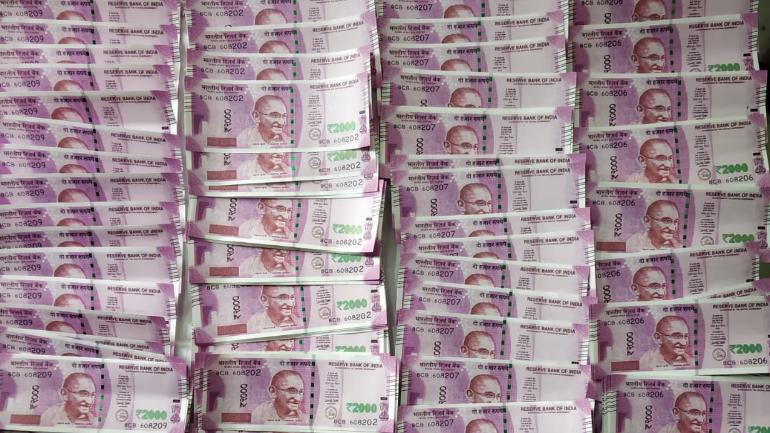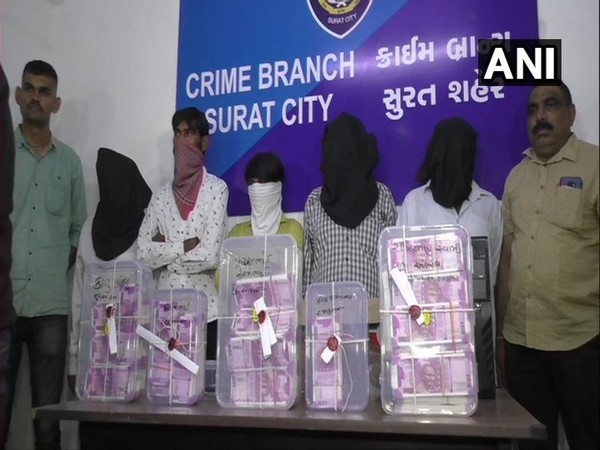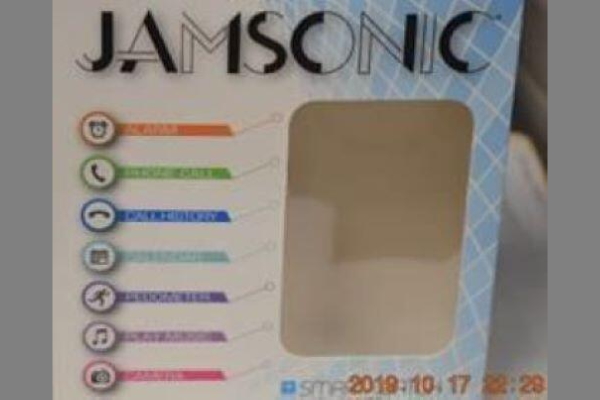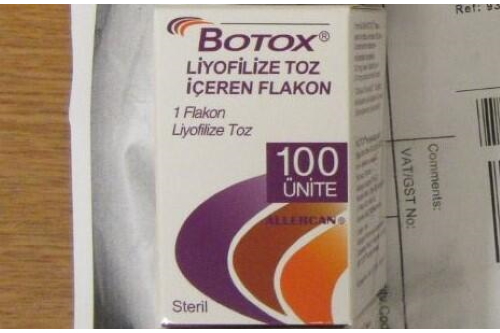Chinese man arrested at Nepal airport with 1kg of gold hidden up his backside
Eagle-eyed customs officers at Nepal’s Kathmandu Tribhuvan International Airport have arrested a man with 1kg of gold concealed inside his rectum.
The Chinese national, named by the Himalayan Times as 22-year-old Sa Luitui, was pulled to one side by security workers at the airport after they noticed he was walking in a peculiar fashion.
Having arrived on a Tibet Air flight from China, the man was asked to pass through an x-ray machine after his discomfort was noticed by officers at the arrivals gate.
Once he had walked through the machine, it was determined he was carrying a quantity of metal concealed inside his body. When questioned, he admitted he had inserted gold up his backside.
He was taken to a local hospital where doctors extracted the gold, which had been placed inside a condom. One end of the condom was left sticking out of the man’s rectum to aid retrieval of the contraband.
Lear MoreDh2.5 million worth of fake products seized in Dubai raids
Dubai Police General HQ has confiscated as many as 25,5600 thousand of counterfeit fire prevention products, worth Dh2.5 million.
The Department of Combating Economic Crimes of the General Department of Criminal investigations at Dubai Police worked in partnership with UL (Underwriters Laboratories) Middle East, a technology security company, and Ten Intelligence, an anti-counterfeit operation to organize an anti-counterfeit campaign.
Brigadier Jamal Salem Al-Jallaf, director of the General Department of Criminal Investigations, said that the department, acting on a tip-off, succeeded to raid two storehouses at Ras Al Khor Industrial Area in Dubai and seize knock-off fire prevention products including many devices and accessories.
“The lack of quality in counterfeits is harmful to consumers threatening their safety since these fake products do not meet the standards of safety and security. It also causes damages to the country’s economy and the original trademark owners,” Al-Jallaf added.
Lear MoreCounterfeit goods costing UK economy £9.2bn
In terms of UK imports, the OECD report estimates that fake goods imported to the UK were worth £13.6bn in 2016, equivalent to 3% of genuine imports, up from £9.3bn in 2013. The most common imported fakes include mobile phones and accessories, clothes, footwear, handbags, and games.
The value of counterfeit and pirated British goods sold worldwide was estimated at £16.2bn in 2016, up from £13.4bn in 2013 and equivalent to 3.3% of UK manufacturing sales.
UK goods particularly targeted by counterfeiters include perfumes, cosmetics, clothing, footwear, leather goods, telecoms equipment, electronic goods, cars and motorbikes.
In absolute terms, IT kit, particularly mobile phones and computers, were the most counterfeited type of goods, with an estimated value of £2.5bn of fakes imported to the UK in 2016.
In relative terms, clothing, footwear, leather goods and handbags, and toys and games were the most targeted by counterfeiters, with fakes accounting for 9.3% and 8%, respectively, of UK imports from these product categories.
Overall, this fake trade led to estimated forgone sales by UK businesses £9.2bn, or 2.7% of total sales in the wholesale and retail sector. The total volume of UK companies’ forgone sales due to infringement of their IP rights in global trade amounted to £11bn, up from £8.6bn in 2013.
https://www.accountancydaily.co/counterfeit-goods-costing-uk-economy-ps92bn
Lear MoreClub Factory Is Selling Fake Products, Officially? Investigation Reveals Fake Watches, Shoes, Sun Glasses & More
It seems like the Chinese e-commerce company Club Factory is treading literally on thin ice. It has been noted that the Chinese company is selling counterfeit products on its platform, claiming it to be “high quality”, as a desperate attempt to establish a tight footfall in the fiercely competitive Indian e-commerce market.
Over the past 5-6 months the firm has been labelling fake products across categories such as cosmetics, watches, perfumes and footwear as “CF Verified” to garner the trust of the buyer, an investigation on the same reveals.
After constant run-ins with the Indian Customs and GST authorities, Club Factory has some nerve to go ahead and stock its platform with bulks of wide range counterfeit products.
No doubt the Indian e-commerce market is highly fierce and competitive but such an approach to seep into the market doesn’t bring up a gree flag for Club Factory, or so it appears.
A quick search on the app reveals about 20 listings for fake “Titan” watches, with discounts as high as 86%. A watch, retailed originally at Rs 3499 is being offered for as low as Rs 699 on the platform.
Lear More
Fake currency gang busted in Delhi, Rs 8.48 lakh in denomination of Rs 2000-notes recovered
An international syndicate, indulging in the circulation of Fake Indian Currency Notes (FICN) in various parts of India, including Delhi and NCR, was busted in Delhi. The special cell team also recovered FICN worth Rs 8.48 lakh in denomination of Rs 2,000-currency notes.
The arrested persons have been identified as Farooq, Shariful Islam, Asif Raj and Mukhtiar Ahmed.
The information was received by the special cell regarding attempts of circulation of FICN by the members of an international syndicate which was bringing counterfeit notes to the national capital and surrounding areas via Nepal and Bangladesh. Secret sources were deployed with specific task to nab the accused.
Surveillance was mounted on the movements of members of this syndicate and requisite intelligence was collected. The efforts of more than four months by the team revealed that FICN is being pumped into India from Nepal and Bangladesh through Indo-Bangla border Malda District, West Bengal. It was also revealed that FICN was being pumped by these racketeers in various parts of the country including Delhi-NCR through this route.
On November 21, specific information was received that one Farooq at Lambu of West Bengal’s Malda district, who is a key member of the syndicate, would reach Delhi at Siri Fort Road Bus Stand at 6 pm to receive a big consignment of FICN from his contact. Having received the above information, police team swung into action and a trap was laid near the said bus stop. At around 6.30 pm, two persons were nabbed with 300 Fake Indian Currency Notes in the denomination of Rs 2000, amounting to Rs 6 lakh.
Lear More
Fake Indian currency of Rs 1 crore face value seized in Surat, 5 arrested
The Crime Branch of Gujarat Police has arrested five people here and seized fake Indian currency notes with face value of over Rs 1 crore from their possession, an official said on Sunday.
According to the police, the accused have been identified as Prateek Dilipbai Chowariya, Praveen Chopra, Kadu Chopra, Mohan Madhav and a priest named Radha Raman Swami.
“Based on reliable information, the Crime Branch arrested Prateek Dilipbai Chowariya and recovered fake currency notes with face value of Rs 4 lakh. During interrogation, Chowariya revealed that he, along with some others, had printed fake currency notes with face value of Rs 1 crore,” Deputy Commissioner of Police (Crime Branch) Rahul Patel said.
He said that the police further investigated the matter and busted the entire racket before they could circulate the money in the market.
“Praveen Chopra, Kadu Chopra and Mohan Madhav were also arrested with fake currency with face value of Rs 19, 15 and 12 lakh respectively from Surat,” the DCP said.
Patel said that the accused revealed that they had printed the currency at a house in a Kheda village.
“A temple priest Radha Raman Swami was also arrested from the village with fake currency of Rs 50 lakh. The machine used for printing the fake currency has also been recovered,” he said.
Lear MoreThree held with four kilos gold, Rs 4 crore in Secunderabad
HYDERABAD: Three persons, who were smuggling gold and cash concealed beneath the hand brake of a car, were arrested by the Directorate of Revenue Intelligence (DRI) officials at East Marredpally in Secunderabad on Saturday.
The officials seized 40 pieces of four kg gold biscuits and cash of Rs 4 crore.
Based on specific intelligence, the DRI officials searched a residential house at East Marredpally and found 40 pieces of smuggled gold in a green coloured bag kept in a vehicle parked inside the premises.
A sum of Rs 1.99 crore and sale proceeds of gold was found in another car parked on the same premises.
During the preliminary inquiries, it was found that two persons travelled in a car from Calicut via Mysuru to Hyderabad and were carrying smuggled gold concealed in a compartment beneath the hand brake which is created exclusively to carry gold and money. Three persons were arrested and will be produced in the court.
Lear More
CBP seizes 20,000 fake Jamsonic smart watches
Customs officers at International Falls Port of Entry in the US seized almost 20,000 counterfeit smart watches bearing the Jamsonic brand.
Customs and Border Protection (CBP) found the shipment – worth almost $600,000 if genuine – on a train entering the US from Canada that was destined to arrive in Ranier, Minnesota.
The rail container contained smart watches” in violation of intellectual property rights (IPR) regulations,” says the agency.
Lear More
Counterfeit Botox seized in Cincinnati
Customs officers at a Cincinnati express consignment facility have seized multiple shipments of counterfeit Botox injections, a wrinkle treatment sold by drug maker Allergan.
The shipments, manifested as “leggings” and “facial gift,” were coming from Shenzhen, China, and were destined to private residences in Alabama, Texas, and Utah, according to US Customs and Border Protection (CBP).
Botox (onabotulinumtoxinA) – a form of botulinum toxin – is restricted by the FDA and cannot be imported into the US without proper documentation. The FDA has issued an import alert detailing which pharmaceutical companies produce legitimate botulinum toxin products and how these products can legally be imported into the US.
At least some of the imported product is in Turkish packaging (pictured), reminiscent of a notorious incident a few years back when counterfeit vials of Roche’s cancer drug Avastin (bevacizumab) – bearing the Turkish trade name Altuzan as well as Turkish packaging and with no active ingredient – were found in the US market.
Lear MoreThree Men Charged In Largest Tobacco Bust In Maryland History, Comptroller Says
ANNAPOLIS (WJZ) — Nearly half a million dollars of untaxed tobacco products have been seized by the state, in what Maryland Comptroller Peter Franchot is calling the largest tobacco bust in the agency’s history.
During early-morning raids on November 5 at multiple spots in Prince George’s County and Baltimore City, agents from the Field Enforcement Division found a large-scale operation to import and distribute untaxed tobacco products and cigarettes in Maryland.
“The work of the agency’s Field Enforcement Division is second to none, and this latest operation to bring down a criminal enterprise demonstrates solid police work and multi-jurisdictional coordination,” said Comptroller Franchot. “As a result, these lawbreakers will be held accountable and Marylanders will not see lost tax revenue going out the door.”
As a result of the year-long investigation, agents seized thousands of cartons of untaxed tobacco products at a storage facility and at six retail locations.
he combined retail sales value of the seized contraband tallies up to $452,850.92- a total tax loss of $286,325.42 to the state.
Lear More


